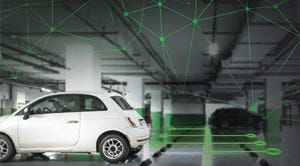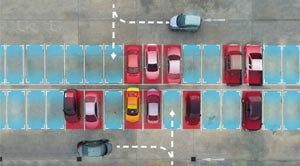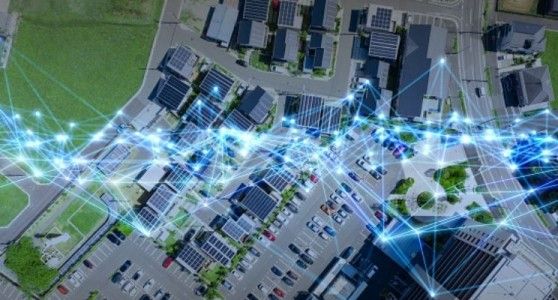Smart parking solutions use a combination of technologies like Artificial Intelligence (AI), IoT, machine learning, and more to identify and report the availability of parking spots in real-time.
Source: CIOReview

Smart parking solutions use a combination of technologies like Artificial Intelligence (AI), IoT, machine learning, and more to identify and report the availability of parking spots in real-time. It leverages information collected from multiple sensors embedded in parking locations that creates a dynamic parking map
Finding a space to park your vehicle is one of the most challenging tasks today. A motorist at least makes a few circles before finding a spot to park their vehicle in a busy street. This is primarily due to the high motor ownership numbers. Finding a parking spot has now become a time and resource-consuming process. In most cases, people are forced to park their vehicles far away from their destination and are required to commute the distance on foot. Smart cities have been a work in progress for some years; however, this cannot become a reality if a parking solution is not found in the near future. Smart parking has burst onto the scene in many regions and is widely accepted as a viable solution to the never-ending parking crisis. Smart parking solutions use a combination of technologies like Artificial Intelligence (AI), IoT, machine learning, and more to identify and report the availability of parking spots in real-time. It leverages information collected from multiple sensors embedded in parking locations that creates a dynamic parking map. Here are some smart parking innovations that will make real-time parking maps a common thing in the future.
Tracking Sensors
Vehicle tracking is possible with GPS and OBD sensors that collect data on cars to determine the occupancy of parking spaces. This information is then processed in a connected server and presented in a readable format with motorists. The foundation of vehicle tracking is IoT, which helps track down vehicles accurately and has a tiny margin of error when backed up with good connectivity. This innovative use of IoT is being used on a large scale by corporations for automotive fleet management.
Automated Parking
An Automated Parking System (APS) is capable of moving cars up and down a multi-story parking facility. This idea also requires minimum space. Being automatic means there is no need to leave space for humans to get out or get in the parking spaces. The idea also reduces the land used for parking structures and is an efficient concept for malls and other places of mass gatherings.
Parking Counter
A parking counter is a digital system that detects the number of available parking slots in a structure and informs the motorist in real-time. The system makes quick notes of vehicles entering and leaving the parking facility and is capable of predicting rush hours and when there will be a surge in demand for parking. This technology is already visible in many places.
Challenges with AI

The congestion that is caused by the random vehicle parking has reached an alarming stage in today’s world. Smart parking steered by AI can help in bring down the quest for parking space and additionally help in managing the parking spaces efficiently. According to a recent study, in cities, about 30 percent of the traffic is because of the drivers and motorists that search for parking spaces.
With the growing number of vehicles and urban migration, availing a parking spot is an exhausting and frustrating affair. Since the traditional parking lots continue to dominate a large part, it gets challenging to establish any new set up for safe parking. The long-established methods are the reason that mishandles and maintains the vehicles with parking personnel, which might also be expensive.
A smart parking system uses cameras and sensors to gather real-time data for measuring the parking occupancy. Smart parking can easily navigate the visitors to a free parking spot based on the information accumulated and stored in its system. Besides, it also helps in better management of the parking systems, bringing in improved revenues and time-saving techniques. AI-driven smart parking methods can analyze data like vehicular traffic, peak hour timings, vehicle type, and occurrences to picture future trends and provide a seamless parking experience round-the-clock.
With the help of digital payment methods, people can save time, and it can improve the operator in the parking space to efficiently run the area. Moreover, one of the essential challenges faced while executing an AI-based smart parking system is the vast variety of software and hardware, accompanied by the capital investment that is required.
The possibilities of implementing AI in car parking systems are endless, and businesses can only develop on technologies to provide better services, along with lesser operating expenses. A completely automated AI-driven robot-based parking system can use robots to park the vehicles as well by going wireless. A smart parking sector is an open business where organizations can capitalize and expand their potential. AI-driven smart parking systems can turn around the face of the industry and transform every method of parking services.
Helping Hotels Solve Parking Issues
For some travelers who drive to lodging destinations for their get-away, bad parking experience may kill their temperament, and their vacation may have an awful start. Today, technology is enabling hotels to guide their visitors to the best spots and give that information back to the hotels. By using cameras and analytics, techniques can sweep and track vehicles with their cameras for inhabitance purposes. At that point, they illuminate the parkers regarding the best bearing and traffic stream to scan for the best parking space.
These innovations utilize machine learning (ML) and artificial intelligence (AI) for recognizable proof and acknowledgment to scan and track vehicles. These advances perceive cars that enter the parking area and present that to educate visitors. A similar data is imparted to the hotels, too, with the goal that they are aware of the visitors, parking problems, the necessity for new parking spots, and that’s just the beginning.Top Travel and Hospitality Solution Companies
Hotels have begun to develop an underground parking structure for self parkers. The hotels, nowadays, need their visitors to appreciate lavish hotel experience before they step-in. They don’t need their guests to consider how problematic the parking experience is, particularly when the staff realizes that when visitors arrive at the registration work area, after an awkward parking experience, they are as of now disappointed. If visitors are self-parking, the technology can help them by guiding them rapidly to the best spot for parking, and they can begin their outing cheerfully without having one idea about the shopping experience.
Now the question emerges that as the technology is getting increasingly regular and getting turned out in more prominent properties, how it will affect hotels’ operations?
Since the hotels don’t need their visitors to speak adversely about the parking experience, their hotel, henceforth, hotels guarantee that the visitors’ luxury experience begins preceding their registration. The technology empowers hotels to direct their drive through traffic via outlets, including valet and self-park. The technology likewise tracks individual vehicle use versus rideshare and different choices of transportation. Space the board and land use are incredibly critical for any hotel. So if hotels can screen stopping patterns, they can search for conceivable elective applications on the off chance that visitors are staying at explicit occasions.
For more information, follow us on:
Twitter (@cioreview)
Linkedin (CIOReview)

